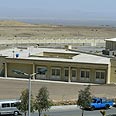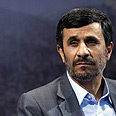
Natanz nuclear facility
Photo: AFP

Iranian President Mahmoud Ahmadinejad
Photo: Reuters
Iran said on Saturday it planned to build an experimental nuclear fusion reactor, state television reported, at a time when the West is demanding that Tehran suspend sensitive nuclear work.
In 2006, Iran said it was pressing ahead with research tests on nuclear fusion, a type of atomic reaction which has yet to be developed for commercial power generation, but this was the first mention in years that the work was continuing.
Held Back
Associated Press
Military official says Moscow will not supply Iran with 'large missile systems' due to UN sanctions
"We need two years to complete the studies on constructing and then another 10 years to design and build the reactor," Asqar Sediqzadeh, head of Iran's Nuclear Fusion Research Center, told Iran's English-language Press TV.
The United States and its European allies suspect Iran is trying to build an atomic bomb, and have imposed sanctions on it in a drive to convince it to drop sensitive nuclear work. Tehran says its nuclear program is for civilian purposes only.
Iran's nuclear chief Ali Akbar Salehi said Iran was ready to cooperate with the international community over the country's National Fusion Energy Project, the Students News Agency ISNA reported, without mentioning the plan to build the reactor.
"The scientific phase of the fusion energy research project is being launched with no budgetary limitation," Salehi said.
Commercial nuclear reactors rely on nuclear fission, a process that generates energy from splitting atoms.
'Won't trade with countries imposing sanctions'
Also Saturday, Iran warned it would stop trading with countries that impose restrictions on its assets abroad in the face of tightening international sanctions over its disputed nuclear activities.
The fourth round of UN sanctions calls for measures against new Iranian banks abroad if a link to the nuclear or missile programs is suspected and for vigilance on transactions with any Iranian bank, including the central bank.
"Any country that creates limitations for Iran's assets, we will stop trading with them," Hamid Borhani, deputy head of the Central Bank of Iran, told the semi-official Mehr news agency. "We have to protect our assets."
The latest measures are mainly aimed at vital sectors of Iran's economy such as banking and energy, which analysts say will raise the cost of trade by making it more difficult to transfer funds or insure cargoes.
Iran says any sanctions imposed on its banking sector will create instability in the world's financial system although the Islamic state will find ways to protect its assets.
The United Arab Emirates, a Washington ally, told financial institutions in the Gulf Arab country in June to freeze any accounts belonging to dozens of firms targeted by the fourth round of UN sanctions.
The hardline Iranian leader has consistently played down the impact of sanctions. President Mahmoud Ahmadinejad has called the UN sanctions a "used handkerchief."
The new sanctions imposed on Iran's banking and financing system may block transactions in euros and dollars.
Iran said on Friday it will shift to other currencies for payment of its oil exports. The dollar is the standard currency for oil trade, but transactions can in theory be carried out in whatever currency the parties involved decide.
- Follow Ynetnews on Facebook















